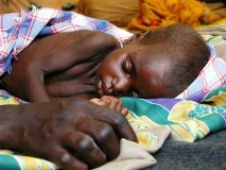Maternal mortality in Sudan among the highest in the world – UNFPA
NAIROBI, Dec 10, 2004 (IRIN) — The high number of women dying in Sudan from causes linked to pregnancy, childbirth and low prevalence of natal care is of serious concern, the UN Population Fund (UNFPA) said on Thursday during its annual country programme review in Khartoum.
 “With the current gap in primary health facilities and the overall number of people affected by the emergency, the situation requires additional efforts to meet the current needs,” Nimal Hettiaratchy, UNFPA representative for Sudan, said in a press statement.
“With the current gap in primary health facilities and the overall number of people affected by the emergency, the situation requires additional efforts to meet the current needs,” Nimal Hettiaratchy, UNFPA representative for Sudan, said in a press statement.
The remarks were made during the annual review of the 2002-2006 country programme of the government of Sudan and UNFPA, which focuses on reproductive health, population and development strategies, and awareness on various population issues.
“UNFPA’s main goal is the attainment of Millennium Development Goal No. 5 – the reduction of maternal mortality by 75 percent by 2015,” Hettiaratchy told the meeting. “In the Sudanese context, this means that the maternal-mortality ratios have to fall down to 178 per 100,000 live births, from the current nationwide average of 509 per 100,000 live births – still one of the highest in the world,” the UNFPA official continued.
UNFPA said it was contributing to better use of quality reproductive health services and information by the population with a special focus on vulnerable groups like adolescents, youths, internally displaced persons and refugees. For the coming year, “an additional focus is needed on female genital mutilation, adolescent health, HIV/AIDS and family planning,” UNFPA Deputy Director Hassan Mohtashami said.
“This cooperation and aid have had a great impact on the improvement of population and development issues,” Yousif Sulaiman Takana, Sudanese minister of international cooperation, said at the annual review meeting.
UNFPA has responded to the humanitarian crisis in Darfur by opening 3 sub-offices in the region. It has allocated US $1.4 million to start extensive programmes on responsible motherhood, sexually transmitted diseases, including HIV/AIDS, and gender-based violence.
The 2005 work plan presented at the review contained 30 projects for which financing worth more than US $44 million is being sought. The minimum requirement considered to meet the emergency was $6 million, including recovery and post-recovery phases in Darfur.
UNFPA will also further widen its activities to the south, in anticipation of a comprehensive peace deal between the government and the rebel Sudanese People’s Liberation Movement/Army (SPLM/A), expected by the end of the year.
Takana agreed that the signature of the comprehensive peace agreement would only be the first step in the right direction.
“This agreement will not ensure the continuity of a long-lasting peace unless we start implementing a comprehensive programme for rehabilitation and development to meet the urgent and long-term needs of the returnees, the internally displaced people, refugees and others, who were affected directly or indirectly by the conflicts and wars,” Takana noted.
To this end, UNFPA has allocated $250,000 in 2004 in support of Sudan’s Central Bureau of Statistics to prepare for a comprehensive population census. In 2005, the Population Fund will fundraise $27 million to be used for the preparatory phase of the census, which will cover all of Sudan, including SPLM/A controlled areas.
“The census is one of the essential tools for maintaining peace, as it provides detailed disaggregated data for fair resource allocation, proper policy planning and, thus, development,” Hettiaratchy explained.
The war between the SPLM/A and the Sudanese government erupted in 1983 when the rebels took up arms to demand greater autonomy for the south. The peace talks have been held in the Kenyan town of Naivasha since mid-2003 and are expected to be concluded by the end of this year.
The war in Darfur pits Sudanese government troops – and militias allegedly allied to the government – against rebels fighting to end what they have called marginalisation and discrimination of the region’s inhabitants by the state. The conflict has displaced an estimated 1.45 million people and sent another 200,000 fleeing across the border into Chad.
